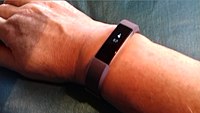
Photo from wikipedia
Introduction This study aims to assess existing sleep apps for mobile phones to determine the perceived effect of these applications on user’s attitudes, knowledge, willingness to change, and its likelihood… Click to show full abstract
Introduction This study aims to assess existing sleep apps for mobile phones to determine the perceived effect of these applications on user’s attitudes, knowledge, willingness to change, and its likelihood to change behavior from a user’s perspective. Material and Methods A systematic search was conducted through Google play store and iTunes Apple store using terms related to sleep tracking. Apps were evaluated using Mobile Application Rating Scale (MARS) tool for assessing and classifying mobile health applications quality. Additionally, a convenience sample of subjects were asked to evaluate the included apps for perceived sleep behavior changes. Results The average MARS app quality score on a 5-point scale was 3.3. Between 30-50% of participants believed that sleep tracker apps are likely to increase awareness about sleep patterns and sleep hygiene, infuence sleep hygiene habits, and are likely to encourage help seeking for sleep hygiene when required. Conclusion Apps available for sleep self-management and tracking may be valuable tools for self-management of sleep disorder and/or improving sleep quality, yet they require improvement in terms of quality and content, highlighting the need for further validity studies.
Journal Title: Sleep Science
Year Published: 2022
Link to full text (if available)
Share on Social Media: Sign Up to like & get
recommendations!